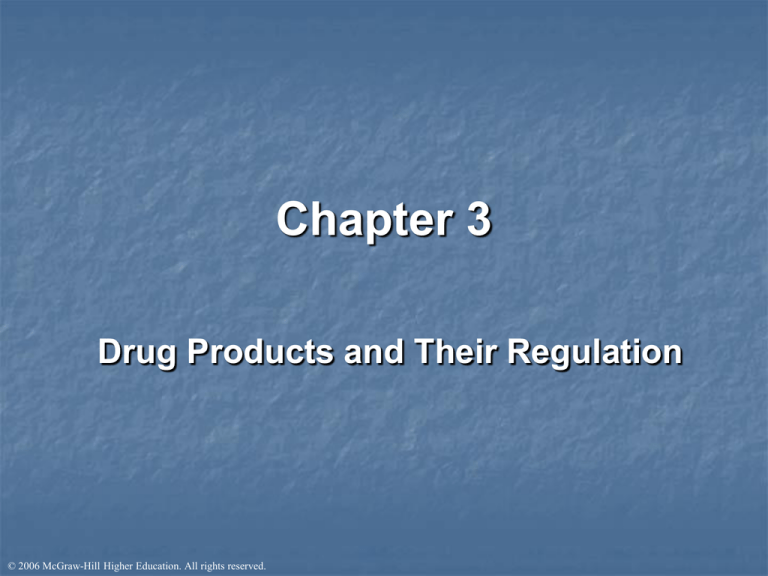
Chapter 3
Drug Products and Their Regulation
© 2006 McGraw-Hill Higher Education. All rights reserved.
Reformism
Race and fear used
Laws came to regulate moral behavior
© 2006 McGraw-Hill Higher Education. All rights reserved.
Issues Leading To Legislation
Fraud in patent medicine
Opium
1890 federal act allowed only American citizens to
import opium
Morphine
Hostetter’s Bitters 44% pure alcohol
Birney’s Catarrh Cure 4% cocaine
“Morphinism”
Cocaine
Mail order cocaine
© 2006 McGraw-Hill Higher Education. All rights reserved.
Two Bureaus, Two Types Of
Regulation
The Pure Food and Drug Act
Department of Agriculture
Ensures drugs were pure and honestly
labeled
Harrison Act
Treasury Department
Taxing of drug for revenue
© 2006 McGraw-Hill Higher Education. All rights reserved.
Regulation
1906 Pure Food And Drugs Act
Purity
Safety
The contents of the product must be correct and
labeled correctly
1912 Sherley Amendment
Set up FDA as gatekeeper
Directions must be included
Effectiveness
1962 Kefauver-Harris Amendments
© 2006 McGraw-Hill Higher Education. All rights reserved.
Making Of A New Drug
Preclinical research and development
Clinical research and development
Phase I
Phase II
Phase III
Permission to market
© 2006 McGraw-Hill Higher Education. All rights reserved.
Making Of A New Drug
Exceptions
Fast-track rule
Orphan Drug Law
Dietary Supplements
© 2006 McGraw-Hill Higher Education. All rights reserved.
Controlled Substance
Early enforcement of the Harrison Act
18th Amendment
The Narcotic Division
Arresting physicians and pharmacists
Stiffer Penalties
Jones-Miller Act
Prohibited the importing of opium for heroin
© 2006 McGraw-Hill Higher Education. All rights reserved.
Controlled Substance
Mandatory Minimum sentences
The Bureau of Narcotics
Drug Czar
Marijuana Tax Act
1956 Narcotic Drug Control Act
© 2006 McGraw-Hill Higher Education. All rights reserved.
Drug Abuse Control Act
Amendments Of 1965
Comprehensive Drug Abuse Prevention and
Control Act 1970
Replaced or updated all laws
Federal vs State
Prevention and treatment
Control, not tax
© 2006 McGraw-Hill Higher Education. All rights reserved.
Summary of Controlled Substance Schedules
Schedule
I
Criteria
a.
b.
c.
II
a.
b.
c.
III
a.
b.
c.
IV
a.
b.
c.
V
a.
b.
c.
Examples
High potential for abuse
No medical use
Lack of accepted safety
Heroin,
Marijuana
High potential for abuse
Current accepted medical use
Abuse may lead to psychological or physical dependence
MDMA,
Morphine,
Cocaine
Potential for abuse less then I and II
Current accepted medical use
Abuse may lead to physical dependence or high
psychological dependence
Low Potential for abuse less then III
Current accepted medical use
Abuse may lead to limited physical or psychological
dependence relative to III
Potential for abuse less then I and II
Current accepted medical use
Abuse may lead to physical dependence or high
psychological dependence
© 2006 McGraw-Hill Higher Education. All rights reserved.
Anabolic steroids,
most barbiturates
Vanax, barbital,
Chloral hydrate,
fenfluramine
Mixture having small
amounts of codeine or
opium
Drug Abuse Control Act
Amendments Of 1965
Possession and Selling Penalties
Omnibus Drug Act
Loss of Benefits
Drug precursors
Drug paraphernalia
Office of National Drug Control Policy
© 2006 McGraw-Hill Higher Education. All rights reserved.
Americans in Prison
© 2006 McGraw-Hill Higher Education. All rights reserved.
State And Local Regulations
Difference in penalties from state to state
Federal Support for Urine Screening
Federal law overrides state
Military led the way
More advanced screening
Transportation and private companies test
Schools test
Testing methods
Different test different results
© 2006 McGraw-Hill Higher Education. All rights reserved.
Impact Of Drug Enforcement
People
Budget
International programs
Other costs
Effectiveness of Control
© 2006 McGraw-Hill Higher Education. All rights reserved.






